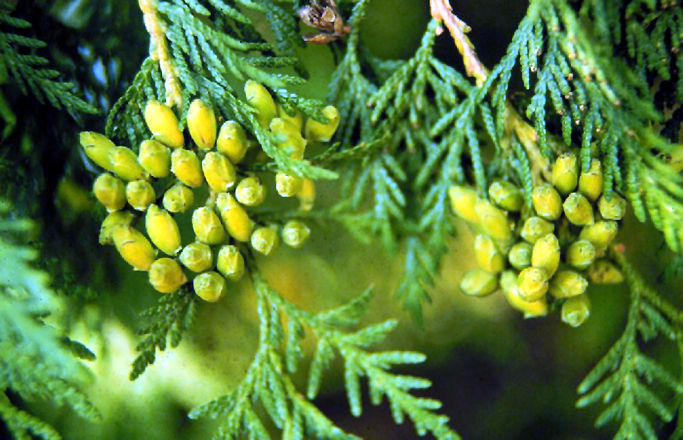Thuja occidentalis
- Thuja is a tree. The leaves and leaf oil are used as a medicine.
Contents
Uses
- Thuja occidentalis is used as a homeopathic remedy.
- Thuja is used for respiratory tract infections such as bronchitis, bacterial skin infections, and cold sores. It is also used for painful conditions including osteoarthritis and a nerve disorder that affects the face called trigeminal neuralgia.
- Some people use thuja to loosen phlegm (as an expectorant), to boost the immune system (as an immunostimulant), and to increase urine flow (as a diuretic). It has also been used to cause abortions.
- Thuja is sometimes applied directly to the skin for joint pain, ostearthritis, and muscle pain. Thuja oil is also used for skin diseases, warts, and cancer; and as an insect repellent.
- In foods and beverages, thuja is used as a flavoring agent.
- In manufacturing, thuja is used as a fragrance in cosmetics and soaps.
Benefits
- Thuja contains chemicals that might fight viruses.
Cautions
- Thuja contains a chemical called thujone that can cause brain problems.
- This is a homeopathic remedy. Please consult your doctor before administering homeopathic remedies and proceed with caution.
- See Homeopathy for more information.
Other Names
American Arborvitae, Arborvitae, Cedar Leaf Oil, Cèdre, Cèdre Blanc, Cèdre Blanc de l’Est, Cèdre Blanc du Nord, Cèdre Commun, Eastern Arborvitae, Eastern White Cedar, Hackmatack, Huile de Feuilles de Cèdre, Northern White Cedar, Swamp Cedar, Thuga, Thuja, Thuja occidentalis, Thuya, Thuya du Canada, Thuya d’Occident, Tree of Life, White Cedar.
References
Source: WebMS, “Thuja”, www.webmd.com/vitamins-supplements/

